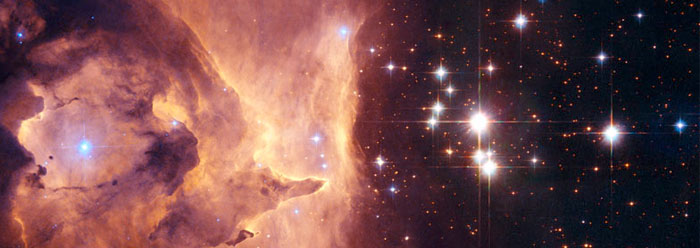Christians who believe the universe began billions of years ago often point to the Big Bang model to try and verify a creation-like beginning.1 But a new origin of the universe model offers an "everlasting universe" and dismisses the whole idea of a Big Bang.2
Genesis does not describe a Big Bang. Instead of a hot explosion, it presents a rather cold, watery origin. Instead of stars first, followed by Earth's emergence billions of years later, God made Earth first, then stars four days later. If the Big Bang really happened, then nobody told God about it. And if Scripture's history falls this far off base, then what other errors might it contain?
Despite the dangers that the Big Bang presents for the Bible—to say nothing of the baffling scientific quandaries it generates—some Christians continue to believe it and even use it to argue for creation. But this noble intention can have bad results.3 Lured by the prospect of illustrating how secular science incorporates a kind of beginning point for the universe that could merge with the concept of God, this particular argument pays the price of accepting a model with almost no resemblance to Genesis.
And how can anyone trust the books of the Bible that refer to the creation account if Genesis is almost completely wrong? After all, those books also teach us about Christ, the focal point of the Christian faith.
In the new model, published in Physics Letters B, researchers included quantum correction terms to the standard formula assumed in Big Bang cosmology. This time, the formula ended up describing a universe with no beginning and no end.
Why would scientists even think to challenge a long-held concept like the Big Bang unless they saw some deal-breaking weaknesses in it? Their paper lists some of the flaws they recognized, including "the smallness problem," "the coincidence problem," "the flatness problem," dark matter, and the inexplicable singularity from which the universe supposedly sprung.2,4
So, the second price Big Bang-promoting Christians will have to pay is swallowing all these problems, each of which refutes Big Bang cosmology. Without compromising either biblical history or observational science, Christians can simply believe and defend the exact words of Genesis.
References
- Geisler, N., and Turek, F. 2004. I Don't Have Enough Faith to Be an Atheist. Wheaton, IL: Crossway, 73-89.
- Ali, A.F., and Das, S. 2015. Cosmology from quantum potential. Physics Letters B. Volume 741(4): 276–279.
- Creation scientists have been warning Christians of this danger for years. See: Henry, J. F. Christian apologists should abandon the big bang. Journal of Creation. 23 (3): 103-109.
- Dr. Jake Hebert describes how inflation theory, a Big Bang add-on, failed to explain the flatness problem in: Hebert, J. 2012. Big Bang Explanations Fall Flat. Acts & Facts. 41 (11): 16.
- Hebert, J. 2013. The Ever-Changing Big Bang Story. Acts & Facts. 42 (1): 14.
Image credit: Copyright © 2006 NASA, ESA, and J. Maíz Apellániz. Adapted for use in accordance with federal copyright (fair use doctrine) law. Usage by ICR does not imply endorsement of copyright holders.
*Mr. Thomas is Science Writer at the Institute for Creation Research.
Article posted on February 23, 2015.






















